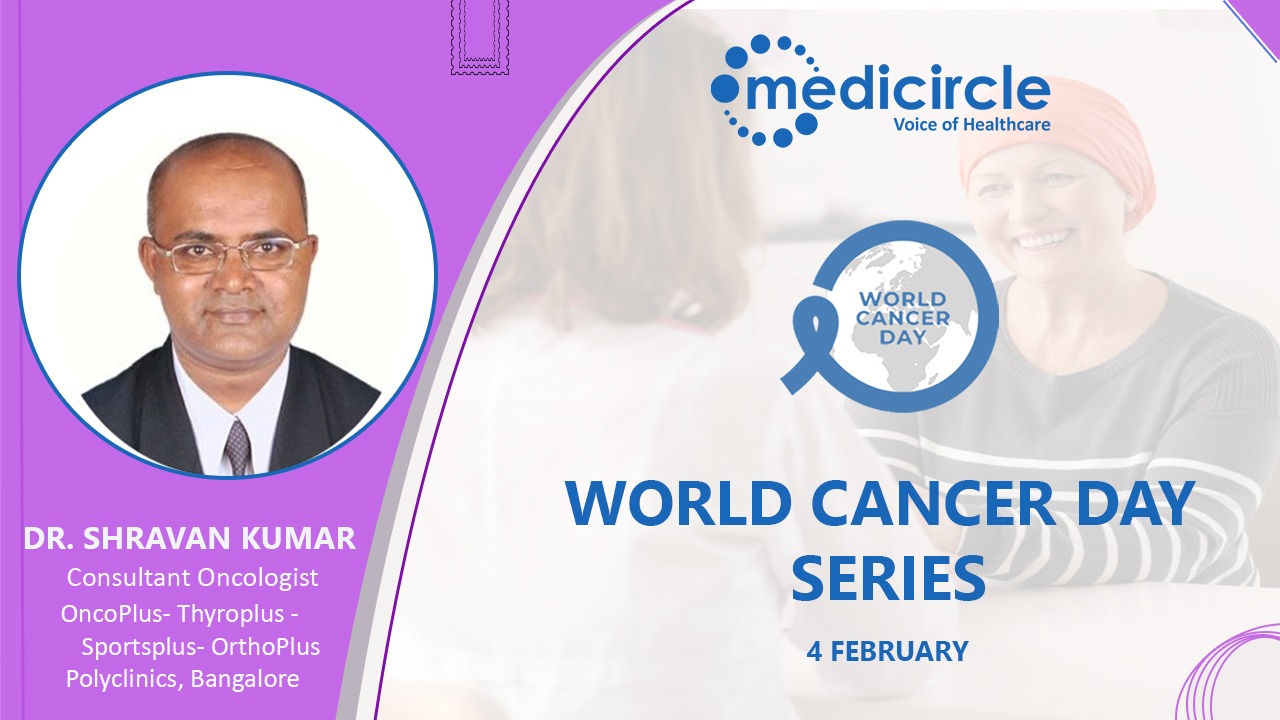More than 10 million people around the world die each year from cancer. Experts project that cancer cases would rise to 13 million by 2030. Medicircle is conducting an exclusive interview series with eminent oncologists to bring awareness about cancer, its treatment, and myths related to it.
Dr. Shravan Kumar is an experienced Consultant Oncologist. He is currently associated with OncoPlus- Thyroplus - Sportsplus- OrthoPlus Polyclinics, Bangalore. He has worked with various well-known hospitals in India and Bangladesh. He has also served as a Medical Consultant and Acting Chairman for Precision Oncology at the Ministry of Health (MOH) in the Kingdom of Bahrain. He has authored various research papers including, “Management of Ewing’s Sarcoma - Today and Tomorrow”, which was published in the Indian Journal of Radiation Oncology. He is passionate about Precision Oncology with the active incorporation of artificial intelligence in cloud-based technology.
Common cancers of India are curable
Dr. Kumar sheds a positive light on the three most common forms of cancer in India. He says that all the three types of cancers - breast cancer, cervical cancer, and oral cancer are curable if there is a good degree of awareness, early diagnosis resulting in early treatment, and good follow-up later on. He points out:
“Simple techniques like self-breast examination and yearly mammography helps in early detection of breast cancer. Early detection leads to early treatment. The death rate from breast cancer has come down by almost 50% these days due to advanced technology. There is A 20-year survival rate now. Cervical cancer is almost more than 90% preventable with vaccination alone. Complete cure is possible through advanced precision oncology techniques. Oral cancer (Head and Neck cancer) happens mainly due to smoking and tobacco use. It’s caused by the HPV virus as well. Prevention is possible through the HPV vaccine. Also, self-oral examination and clinical oral examination can bring down oral cancer cases by more than 80%,” says Dr. Kumar.
“Genetic” and “Hereditary” are not interchangeable terms in the sphere of cancer
Dr. Kumar explains that “every cancer is genetic but may not be hereditary. Every cancer happens due to mutation in genes and thus it is genetic. Whereas, hereditary means that there is a family history of cancer and that is why one is suffering from it. So, all cancers are genetic but all cancers are not hereditary,” says Dr. Kumar.
Smart technology is playing a good role
Dr. Kumar points out that advancements in smart technology and the resultant increase in awareness amongst people are giving positive results. All information is easily available. Through their smartphones, everyone knows about cancer, its causes, and how to prevent them. This is helping in early detection and early treatment.
(Edited by Amrita Priya)

 “Awareness, early diagnosis, early treatment, and good follow-up can make cancer 100 percent curable,†says Dr. Shravan Kumar, Consultant Oncologist.
“Awareness, early diagnosis, early treatment, and good follow-up can make cancer 100 percent curable,†says Dr. Shravan Kumar, Consultant Oncologist.








.jpeg)



.jpg)






.jpeg)

.jpg)




.jpg)




.png)

